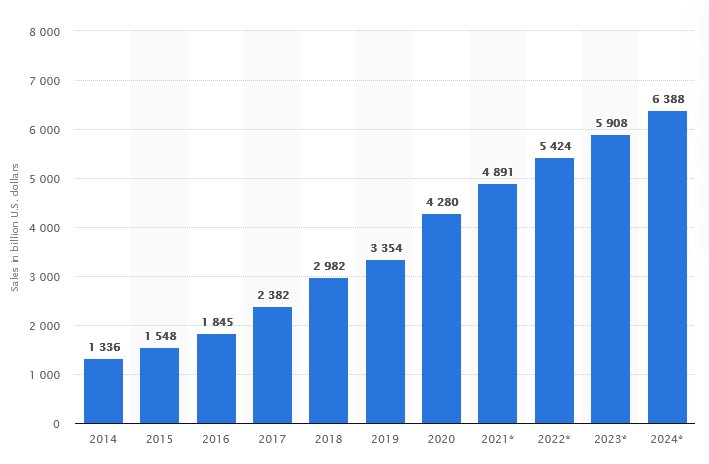
You might be a wonder to know that eCommerce is the only sector that has been flourishing and drastically revolutionized the way we shop- largely due to modern customer’s preferences and technological advancements. US eCommerce sales crossed approx. $791.7 billion amid 2020, Digital Commerce’s study has stated that.
Technology has become mainstream across all sectors and advancing at breakneck speed. “Machine learning,” “Artificial Intelligence,” “AR/VR,” etc., have become buzzwords as they have the capability to perform what we thought. From personalized recommendations to advanced search options, machine learning is being used in eCommerce to achieve better outcomes.
Machine learning is a part of Artificial Intelligence as it widely facilitates online businesses as well as consumers. Brands in various verticals are using ML to improve the overall customer journey because they have realized machine learning’s potential to create new business opportunities.
What is machine learning?
Machine learning is all about making machines able to learn and understand things on their own without human touch and intervention. In short, ML reduces the human effort to automate processes and deliver results that are explicitly accurate and error-free. It is very much like a robot that is very efficiently working for you.

How ecommerce benefit from machine learning?
If you are running an online store, there are plenty of ways you can leverage the power of machine learning to deliver a unique customer experience, become more agile and generate new sales opportunities that may have been previously impossible to access.
Machine learning technology is helping eCommerce brands to take the customer experience to the next level. From personalized marketing to advanced search filters to improved customer service, there are a number of ways in which the power of ML can deliver the best results to your eCommerce business.
As per Statista, in 2019, the global retail online sales crossed $ 3.53 billion; the industry has not only changed customer’s preferences but revamped the entire retail ecosystem. Moreover, the corona pandemic has acted as fuel for the online grocery industry. More and more retailers are adopting the solution like white label grocery app as they are walking on the path of Amazon Go and Instacart and implementing emerging technology such as ML to:
- Understand customer behavior
- Improve customer support
- Achieve accuracy in inventory
- And pricing
Let’s see how machine learning in eCommerce plays a significant role and fundamentally improves conversions and sales.
Machine learning and the customer experience.
Delivering a top-notch customer experience is the key to success. Machine learning allows eCommerce business owners to create a more personalized customer experience. From crafting personalized emails to notifications, modern customers expect personalization.
In a study conducted by Janrain, more than 73% of customers are fed up with random marketing emails and content. Here AI and ML enable retailers to personalize each transaction, from social media feed to content to marketing emails; ML delivers a better customer experience.
As a result, it reduces cart abandonment rates, increases customer engagement level, and boosts sales. And communication tools like chatbots assist customers round the clock without getting bored and frustrated.
Machine learning and intuitive search.
Not all customers are great with keywords, yet they want to quickly find what they are looking for. Machine learning here cranks that up by offering related suggestions in a search bar or synonyms that help customers find products. Search results based on these factors help customers exactly what they are looking for and also suggest similar products and services.
Along with advanced search results, voice search is trending in eCommerce and helping customers find products quickly. Research suggested that voice search might take over manual search by 2021.
Shopping via voice search proves a total game-changer for the eCommerce industry. Here consider an example of eBay where more than 800 million items are listed, retailers taking full advantage of machine learning algorithms, and displaying the most relevant search results to consumers.
Improved marketing strategy.
Unlike traditional marketing strategies, digital marketing techniques have made it possible to promote products and services without any boundary or barrier. Machine learning technology helps marketers curate marketing campaigns based on their demographics. With the adoption of ML…
- The system can predict consumer behavior and preferences.
- ML can predict suitable promotions based on product shares and views.
- Based on customer’s recent purchase history, ML helps brands to create personalized marketing strategies that increase revenue and user engagement.
In order to achieve a higher profit ratio, brands either need to increase the revenue or reduce the expenses, and ML makes it possible as it reduces operational cost.
Machine learning and product recommendations.
Unlike brick-and-mortar stores where salespeople ask your needs and help you find what you are looking for, eCommerce retailers use machine learning to anticipate customer needs and recommend products based on their past purchases and preferences. Personalized product recommendations increase the revenue and sales dramatically.
Hence, many brands have leveraged machine learning to create a product recommendations engine because they have the ability to identify trends and customer’s preferences. McKinsey and Company have stated that 75% of customers enjoy Netflix because of its personalized show recommendations, while 30% of purchases are made on Amazon due to product recommendations.
ML is for today, not just tomorrow.
All in all, machine learning is here to stay and affect the eCommerce industry in the future and the present. If you want to grow the revenue of your eCommerce store, leverage machine learning techniques as it can help you generate more sales opportunities, improve customer experience, convert prospects into customers and even build personalized relations with customers.
Leave a Reply